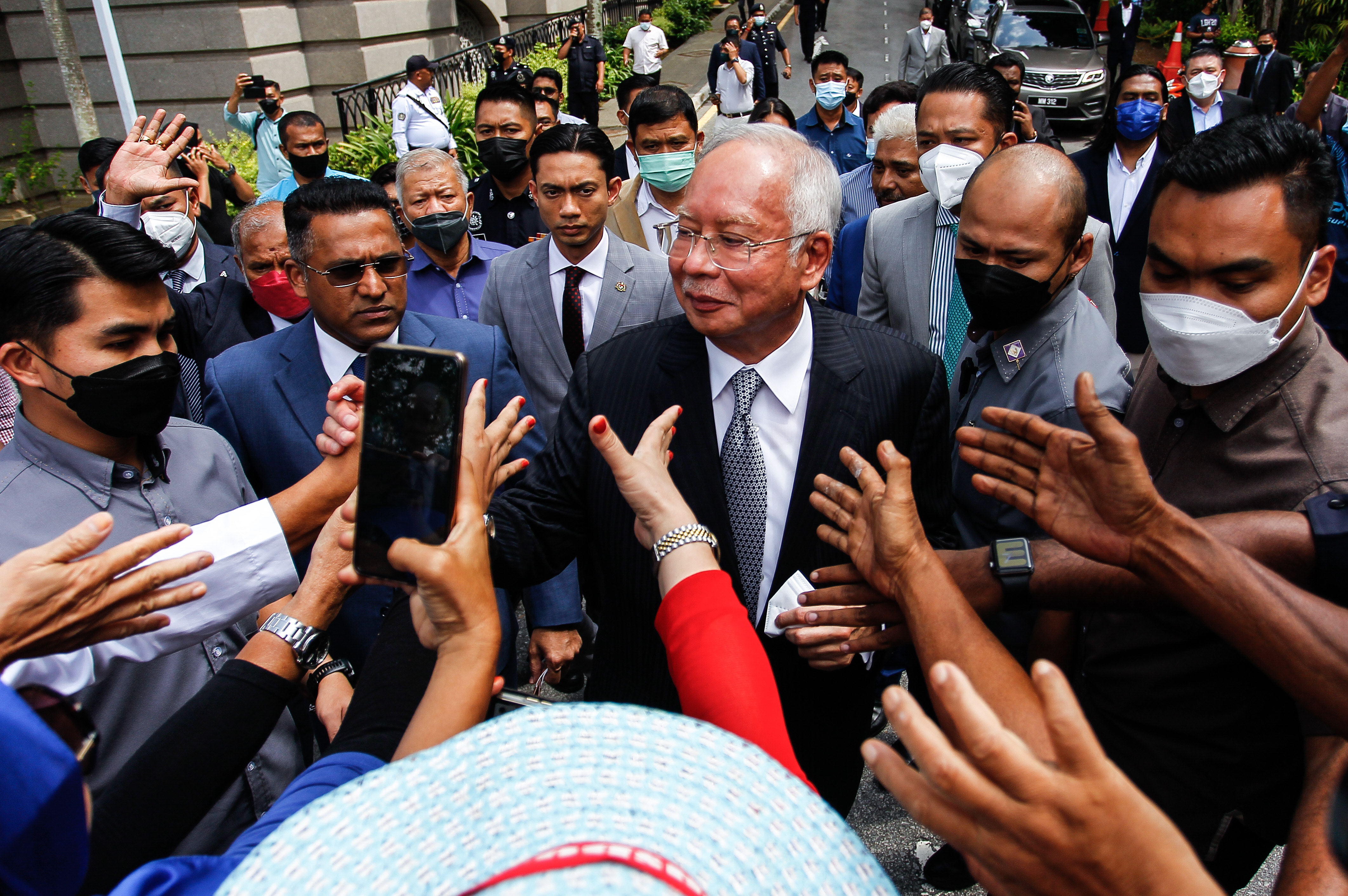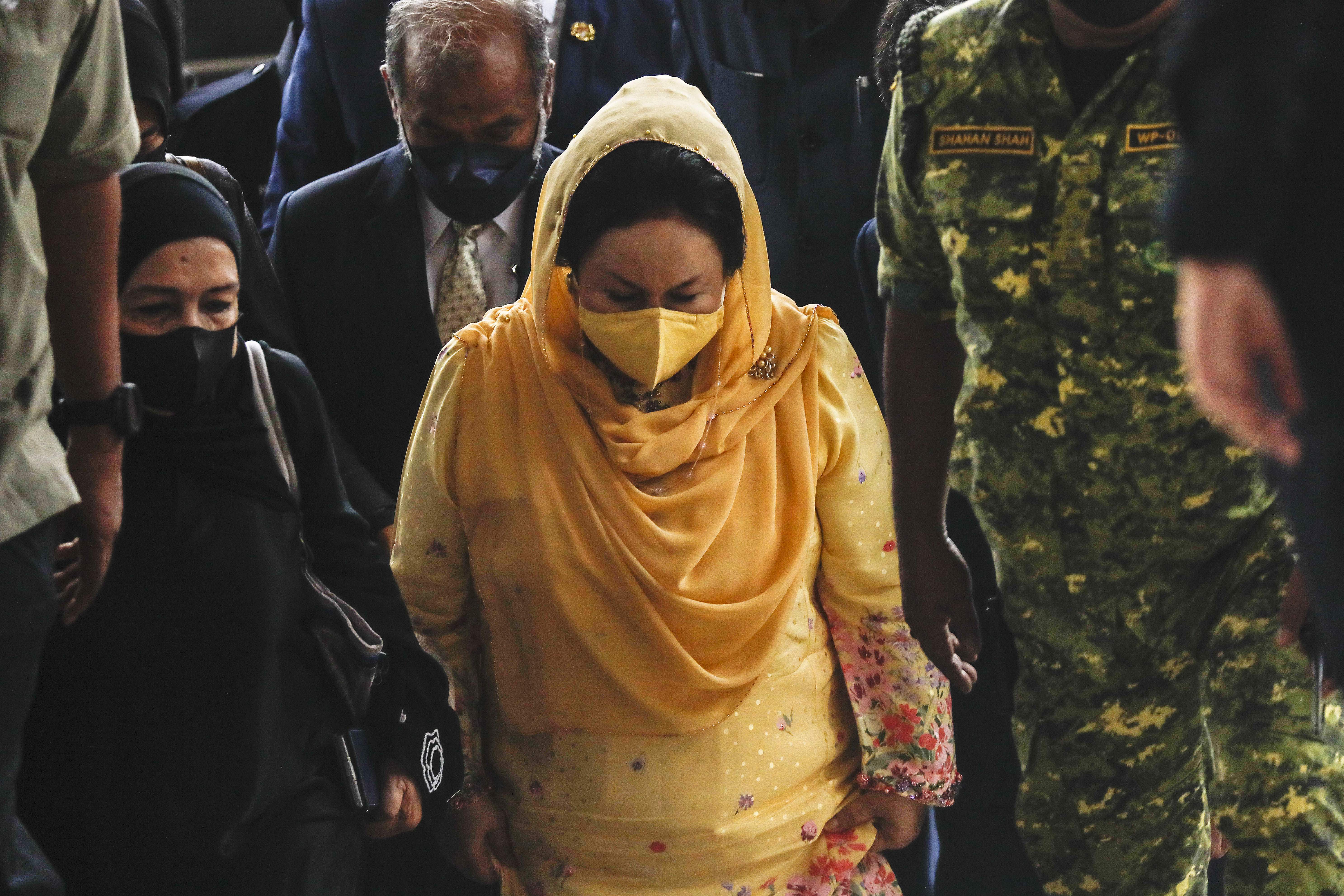As former President Jacob Zuma continues his attempts to evade prison, Najib Razak, Malaysia’s former prime minister, has just bagged himself another term.
Except, this time, he won’t be sitting in the lap of a luxurious and stately office. Instead, he will start serving his 12-year prison sentence for corruption-related charges. The charges relate to the 1Malaysia Development Berhad (1MDB) scandal, a sovereign investment scheme which authorities say cost the Malaysian public more than $4.5-billion (R82-billion).

Malaysia’s former prime minister Najib Razak (C) speaks to his supporters during a break in his final appeal trial outside the Federal Court in Putrajaya, Malaysia, 23 August 2022. The Malaysia highest court has scheduled hearings through 26 August 2022 to hear Najib’s appeal of his convictions for criminal breach of trust, abuse of power and money laundering over the alleged theft of 4.4 billion Euro from 1Malaysia Development Berhad (1MDB), a state fund he co-founded as premier in 2009. EPA-EFE/AHMAD LUQMAN ISMAIL
For context: 1MDB is a sovereign wealth fund — an entity wholly owned by the Malaysian government, and which bears some resemblance to South Africa’s state-owned enterprises. 1MDB was purportedly set up to promote development and long-term economic growth on behalf of the Malaysian people. Instead, it served as a personal piggy bank for Najib and his inner circle. The entire scheme was the brainchild of Najib’s close business associate and current international fugitive Jho Low.
The reckless and extravagant way in which 1MDB funds were spent has been well-documented, from funding Hollywood blockbusters such as The Wolf of Wall Street, purchasing the $250-million superyacht Equanimity or securing comfort for Najib and his wife, Rosmah, who had managed to hoard more than $265-million worth of high-end designer bags, jewellery, and cash inside their home — nothing seemed off limits.

Rosmah Mansor (C), the wife of Malaysia’s former prime minister Najib Razak, is escorted by Royal Malaysia Police officers while she arrives at Kuala Lumpur High Court, Malaysia, 01 September 2022. The High Court judge is scheduled to deliver its decision on Rosmah Mansor’s corruption trial, linked to the 278 million euro Sarawak rural schools’ solar hybrid energy project, on 01 September. EPA-EFE/FAZRY ISMAIL
But how did they manage to do this? 1MDB entered several contracts that were dressed up as “strategic investments” with companies that were masqueraded as legitimate.
Their real ownership, which pointed straight back to Low, was hidden through a complex web of offshore structures and arrangements.
PetroSaudi was one of the many fronts that Low and his associates used for the operation. At the time that the company was scoring hundreds of millions of dollars from deals with 1MDB, it had nothing more than a legitimate-sounding name and a connected but otherwise relatively powerless co-founder, a Saudi prince named Turki bin Abdullah Al Saud. The latter is believed to be in detention by order of the crown prince for his corrupt dealings in an unrelated Saudi Arabian infrastructure project.
The 1MDB scandal was exposed thanks to the courageous investigative efforts of Clare Rewcastle-Brown, her activist team at Sarawak Report and numerous whistle-blowers who risked their lives to expose corruption in Malaysia. In a week in which we remembered Babita Deokaran, the woman who was murdered for blowing the whistle on corruption in the Gauteng Department of Health, the arrest of Najib has resonance in South Africa.
Just like the Guptas who jetted off to Dubai with their ill-gotten gains, Low made off with his untold piles of pilfered cash and took up refuge in China. Fortunately, red carpets have since been replaced by Red Notices from Interpol. However, unlike the Guptas who are currently staring down the long barrel of extradition, reports allege that Low is sitting pretty in Macau under the protection of the Chinese Communist Party.
Visit Daily Maverick’s home page for more news, analysis and investigations
Goldman Sachs fined billions
In its aftermath, the 1MDB scandal has left Malaysia saddled with more than $7-billion of debt. Goldman Sachs, fingered as one of the key corporate enablers, has been fined billions of dollars by Malaysian and US authorities. Goldman Sachs’ former managing director and chairman of its southeast Asia division, Tim Leissner, is facing up to 25 years in a US prison.
Back home, one is left to wonder whether the likes of Bain, McKinsey, PwC, Nedbank and many other implicated entities and individuals that have been exposed by the State Capture Commission will be held to account — beyond simply surrendering fees or apologising.
The United Malay National Organisation (Umno), which Najib led until ousted, has been the governing party since Malaysia’s liberation from Britain in 1957. A victim of its own electoral successes, Umno had spent many years navigating internal political divisions and strife. However, Umno’s failure to remove Najib after 1MDB was the turning point — ultimately tipping the scales in favour of the Alliance of Hope, a coalition of opposition parties.
So Najib’s fall from grace did not come about because of an introspective Umno. It came through the ballot box. Brazen corruption and impunity inspired voters to replace a party that had enjoyed untrammelled power for over 60 years.
During his trial, Najib and his battalion of lawyers, powered by endless stolen funds, pulled out every “Stalingrad” trick that they could muster trying to secure a retrial with new evidence, asking for more time to “prepare” and accusing the judge of bias.
Numerous postponements were sought for reasons including:
- A pet dog had fractured Najib’s hand;
- Najib had caught a bout of red eye and Covid-19 on separate occasions;
- He had to attend his grandson’s birth in Singapore; and
- The lead counsel’s son had to be sent overseas to study — to name but a few.
There are striking parallels between Malaysia’s 1MDB scandal and our own State Capture saga.
- Najib and Zuma had been heads of state from 2009 before their second terms were brought to a premature end in 2018 — shrouded in a cloud of corruption;
- They both had close business associates, in the form of Low and the Gupta brothers, who were allowed to run rampant with the state kitty;
- They had both hollowed out and installed loyalists within key state institutions to escape any accountability for their nefarious deeds; and
- They are both very well versed in deploying “Stalingrad” tactics in the courts.
Importantly, both schemes were exposed thanks to the courageous acts of whistle-blowers and dedicated investigative journalists.
Najib’s imprisonment is a significant moment for the world and its fight against the abuse of power and corruption. It comes at a moment when democracy is under threat around the world.
As David Miliband compellingly notes, “Looking across the globe we are in what can only be described as an age of impunity … state and non-state actors are behaving as though the law is for fools — because it is.”
Salient lessons for SA
South Africa can learn salient lessons from Malaysia. Zuma’s arrest for contempt of court sparked a glimmer of hope for the rule of law and was intended to send a strong message that no one is above the law, not even a former president.
As Justice Sisi Khampepe put it in the Constitutional Court’s majority decision: “It cannot be gainsaid that the longer that Mr Zuma’s recalcitrance is allowed to sit in the light, and heat, of day, so the threat faced by the rule of law and the administration of justice, curdles … his contempt and contumacy is rebukeable in the strongest sense.”
But Zuma and his legal team have abused the system to delay accountability at every turn. His lawyers have employed litigation tactics that leave much to be desired.
The July insurrection of last year showed the country the lengths to which many are prepared to go to defend Zuma and the flow of corrupt tenders. Many of those who sought to collapse the nation by instigating riots, resulting in the deaths of 354 people, still roam the streets freely. Added to this, the high court set aside the inexplicable decision to release Zuma on medical parole.
With the State Capture Commission now behind us, the real work of accountability begins. Law enforcement will be centre stage, but there is much that needs to be done. Our agencies are in desperate need of capability and capacity.
The National Director of Public Prosecutions, Shamila Batohi, has highlighted the high cost and advanced level of expertise required to successfully prosecute corruption. And yet, for all the supposed political will to tackle impunity, both the National Prosecuting Authority and the Special Investigating Unit had their budgets slashed towards the end of 2021. Our judiciary, South Africa’s bulwark during the worst years of State Capture, has faced an unprecedented wave of politicisation and attack.
President Cyril Ramaphosa will need to demonstrate that his commissions will prove to be a vehicle for change in South Africa rather than a whitewash of all the years that his party closed ranks around Zuma and his fire pool. All this, while ANC factionalism threatens to tear the party up from the inside.
Sadly, the beneficiaries of State Capture have not disappeared either: they hang around in the peripheries ready to stoke domestic tensions and exploit the dire social conditions that they themselves helped exacerbate and in which they thrive.
So, our democracy faces yet another great test. Malaysia has shown us that there may just be a light at the end of the tunnel. DM

















 Become an Insider
Become an Insider
Comments - Please login in order to comment.